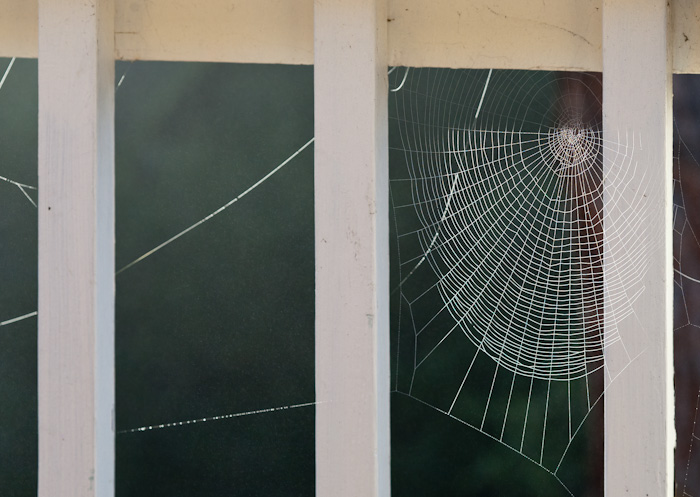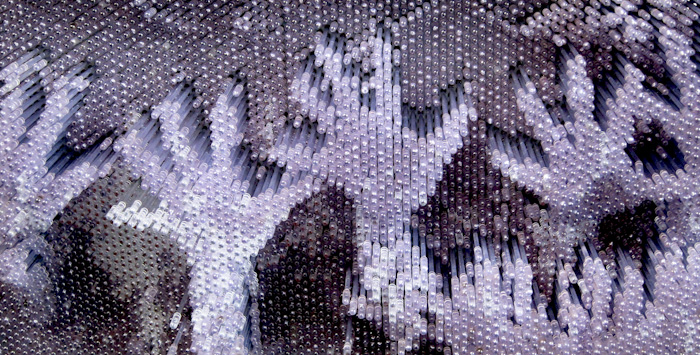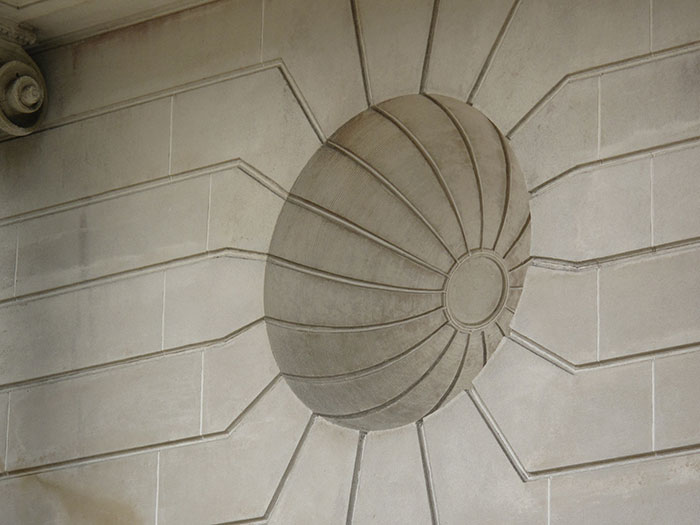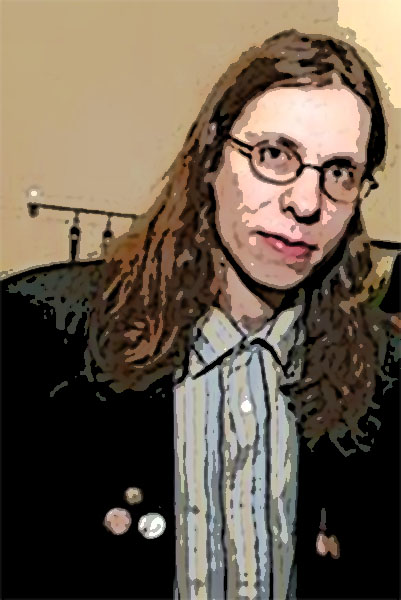
Gertrude and Ludwig Spin A Web
by Justin Patrick Moore

In another order of reality Gertrude Stein was joined in matrimony to Ludwig Wittgenstein. Setting aside their own sexual predilections, they learned to love each other. Besides, they wanted to leave a linguistic legacy and spawn children who could tear a hole in the fabric of language.
Flirtation led to foreplay and foreplay to a congress of sticky secretions. But it wasn’t always easy for the two.
Ludwig tickled Gertrude, made her purr. He was knowing, understanding of her moods, of her being. She intimated to him what to do and he followed into her geography only to find he didn’t know his way around, unfamiliar with her type of plumbing. So they made a word game of exploration and told each other puzzles to keep their minds off the act of copulation. Gertrude detested passion in any of its disguised forms, but managed to live through it, bearing Ludwig not one, but three children, two daughters and a son. Julika, Genevive, and Henrik.
The relations among the siblings were governed by theories recapitulated in the household grammar and the parents became a nuclear unit around which the electrons of their progeny orbited.
The style of family organization was not the only thing nuclear about the Wittgenstein-Stein’s. There was also the matter of the small atomic reactor in their basement, a fission device powered by splitting the parts of speech into their constituent phonemes.
One standard dictionary was enough to fuel their home with enough heat and electrical energy to last an entire decade.
Little did they know that a Comb-Footed spider had sequestered itself inside the reactor when the folks from Half-life Reactions Inc. installed the families home system. Once activated, the entire household was continuously bathed in warm arachnid radiation. This had the most profound effect on the children, who started growing book lungs and developed passions for weaving. They became fascinated by the eight legged Orb spinners that built webs between the spindles of their creaking paint chipped porch every fall.
Gerty and Ludwig, having added to the gene pool, were disposed of their biological duties to each other and gave up sex for a time, contenting themselves for the most part with raising the young ones, and with their respective pursuits. It was a shame, because by now they’d gained some mastery over the mechanics of pleasing each other sexually. But they thought biology was a silly game, and so devoted themselves to abstract thought and aesthetics.
Ludwig worked on his dictionary of neologisms, feeling his compendium of new words would be like several fistfuls of seeds thrown into humanities ongoing philosophical discussions, sprouting new modes of thought. Gertrude set about composing her strange soliloquies while collecting the best in contemporary art—from the maze like meanderings of Mercado’s single line drawings to the frottaged ice and lava landscapes of Sveig Thorsson.

Both were picky people, easily irritated and in the years that followed Ludwig tended to point out Gertrude’s scruples as misunderstandings. Long bitter arguments followed and the very air they breathed was endemic of perspicuous misrepresentations, resolved only after they both groped for a hold on ontological terms they could agree upon.
They fought and fought over terms. Sex would have sufficed for a less brainy pair, but squabbles were their preferred mode of bonding.
“Quarrels may wear out wives,” Gertrude said, “but they help babies,” and so their children grew.
The marital storms were punctuated by bouts of syntactic calm and stretches without much but occasional commas, interruptions in which they both ascertained the connections between loving, liking, listening, a birthday party, a graduation, holidays, the nagging of in-laws and further passages without fluctuation, without proposition. Without question they both agreed upon existing.
And somehow, before the mad flowers of their friendship faded they managed to make love again, as a kindness to each other, during a last tango in her adopted hometown of Paris, rubbing themselves with butter and greasing their way to bliss.
Their own kids had gone off and gotten married themselves, and the first spider babies were about to be born.
Twenty-three spiderlings hatched from their first daughter Julika’s womb. After emerging from the initial shock Doctor von Schniebelhauf cleaned off the combined goop of blood, placenta and spider silk. The babies were pronounced healthy. They had the soft dome shaped skulls of a human child, only with a multiplicity of eyes covering their forehead and temples, while their bodies were all shiny black spider. They made semantic webs for themselves in the hospital and were quickly availed of their mothers milk, along with that of sixteen nursemaids. Then they gorged themselves on the local insect population, gulping down crunchy cockroaches and mosquitoes plump with the blood of schoolgirls on summer holiday.
Gertrude and Ludwig couldn’t have been prouder grandparents. Their line would continue. Excited by the prospects this new turn in evolution had taken, Ludwig encouraged the spiderlings to play string games with silk.
“If people never did silly things,” he admonished them, “nothing intelligent would ever get done.”
The father of the first batch was less pleased than the grandparents. Shunned by his fanatical Christian birth family for spawning unearthly creatures with his heretic bride, he also alienated himself from his children, jealous when they quickly surpassed him in his morphological studies. In the end, after much soul searching and inner anguish, he grew to love them, writing his own work off as that of an amateur.
More batches were born, to Julika, to Genevive, and to Henrik’s wife Alicia. All the siblings and cousins grew up together on the Wittgenstein-Stein’s country estate in Switzerland, halfway between Austria and France, though Gertrude always made pains to remind them that “a house in the country is not the same as a country house.”
There was plenty of room for all and their toddler years were spent getting the hang of dangling from the ceiling by a thread, of gallivanting around on all eight legs and coordinating them in unison, of trapping small rodents and mammals, injecting them with the paralyzing poison and sucking out their liquefied nutrients. The family albums from this time are filled with wholesome pictures of the kids playing board games on rainy Sunday afternoons. Their favorite was Babel, a game whose aim was the scrambling of words from a multitude of languages.

Soon it came time for them to go to school. It was a shock to them. They were unaccustomed to the staring, to the way they were regarded with complete and utter disdain, not only by their fellow students, but by the teachers and headmaster as well. If it hadn’t been for Ludwig’s fortune, and his fat bribes to the school, they never would have been allowed entry. Despite this they excelled at their lessons, and the other children hated them for it. They often came home with three or four broken legs at a time and multiple black eyes.
On these occasions the bullies were always quickly repaid, wrapped in silk cocoons, and left to hang from swing sets and playground contraptions. The teachers would have to cut them down and disentangle them. Not knowing whom the exact perpetrator was, amidst the sixty-nine spiderlings, the whole lot of them were suspended for an entire month.
It got to be so bad they soon finished with school altogether, and so they devoted their entire efforts to the exploration of the other realities they were attuned to. A quirk of biology had made them privy to what was going on in parallel branes, and they could manipulate these branes with the new languages they were inventing daily, languages which were tied into the source code of the Universe itself. All of space-time was available in their minds eye, and they learned how to stitch the strands of destiny however it suited them, sewing new words into the holographic program of the branes and thereby subtly altering them. Others learned to play the quantum strings like a lyre, plucking on the silk-like bosons and fermions to resonate reality however they saw fit.
Lucky for the masses, who feared the descendents of Ludwig and Gertrude would become their overlords, the spiderlings detested the whole tired sorry game of mammalian politics. “Let us leave these unaugmented humans to their feeble-minded bickering,” they often teeped to each other.
Investing in the nascent opportunities for space travel, and accelerating the technology through their own quantum cum psychic manipulations, the family opted for migration and set up a base of operation among the stars. In a distant corner of the galaxy they rest upon a tangled skein, flittering through the multiverse, monitoring the ripples made by newly minted words, maintaining control over local rodent and insect populations.
And—let it be known—these cultured spiders are even now protecting all parallel versions of Earth from transdimensional vermin who might otherwise annihilate each and every instance of our race! All hail Gertrude and Ludwig’s spawn!
About the Author

Justin Patrick Moore is a writer and broadcaster. His essays have been featured in a number of themed anthologies from Aurore Press, the most recent being "The Alchemy of Work" which appears in Living In the Lap of Labor. He is a contributor to the independent music website Brainwashed.com where he has written on the works of Karlheinz Stockhausen in the essay "Music from Sirius" and interviewed Nigel Ayers, the man behind the experimental music project Nocturnal Emissions. A long time library employee, in September 2011 he is giving a talk at the Esoteric Book Conference on the subject of "The Libray Angel and It's Oracle". He is currently at work on a longer space fantasy called "The Spiders of Babel" which relates in a tangential way to a few of the themes only hinted at in this story. On his radio show, On the Way to the Peak of Normal, he will be doing a series of ten episodes about Mnemosyne, Memory, and her children, the Nine Muses. He lives in Cincinnati, Ohio with his wife and family.
Post a comment on this story!